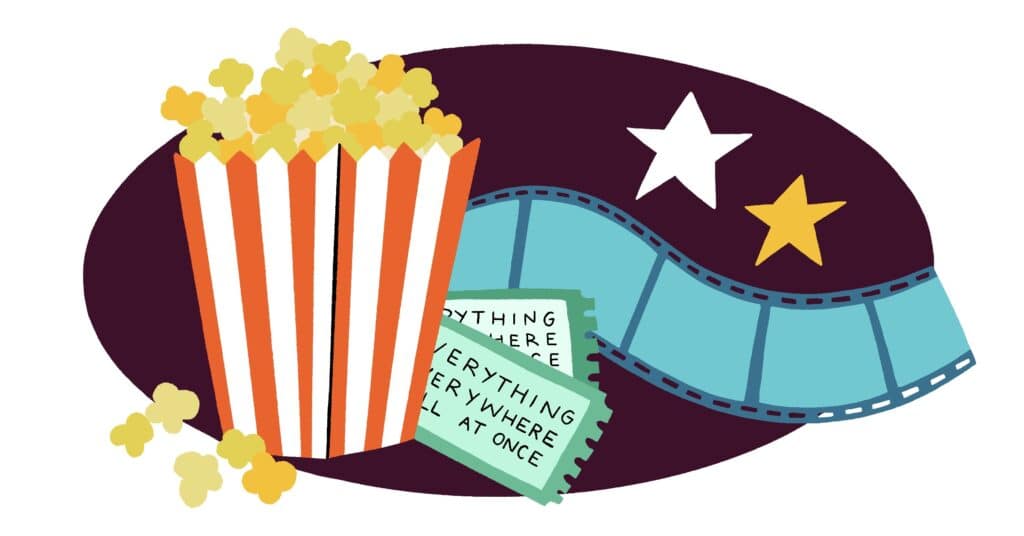
By Beth Levine
“God, always dreaming … Little girl, always running away. Never finishing what you started.” – Gong Gong, as played by James Hong, in the movie, “Everything Everywhere All at Once.”
When Everything Everywhere All at Once swept the Oscars last month, Asian Americans rejoiced in finally being seen in their total humanity. As Anne Anlin Cheng wrote in The Washington Post review of the movie: “To be an immigrant is to live in a fractured multiverse, one riven with geographic, temporal and psychical dissonances.”
But there is another group with geographical, temporal and psychical dissonances that is celebrating being represented realistically — if also metaphorically — in the movie: the ADHD community.
In a Salon interview, the movie’s co-director and co-writer Daniel Kwan noted that the original intent was to create a movie about chaos, which led his team to form the main character, Evelyn (played by Michelle Yeoh, who won the Best Actress Oscar for her role), as a woman with undiagnosed ADHD. Kwan and his filmmaking partner Daniel Scheinert began deep research into ADHD, leading Kwan to suspect that he had it. He has since been officially diagnosed and started therapy.
In the movie, Evelyn, a Chinese American laundry owner — overwhelmed by life, a failing business and an ever-growing IRS problem — is suddenly yanked through alternate universes (or “the multiverse”), where she is an opera singer, a martial arts expert and a chef, among many other identities. She has no time for her sweet husband, Waymond (Ke Huy Quan, who won the Best Supporting Actor Oscar for his role), who is so desperate to capture her attention that he serves her with divorce papers.
Her daughter Joy (Stephanie Hsu, who was nominated for a Best Supporting Actress Oscar for her role) is in a massive depression from her mother’s criticisms, a result of Evelyn’s anxiety about being judged. And part of the tax problem comes from trying to deduct expenses for her never-initiated career dreams: novelist, chef, teacher, singing coach, Watsu practitioner. If you are a person with ADHD, this may sound familiar: the inability to stay rooted in the present; anxiety over how you are perceived; the prickly feeling that you just didn’t get the same operating instructions that the rest of the world has gotten.
In fact, several people with ADHD who were interviewed for this article mentioned that the experience of watching the movie mimicked their everyday experience so realistically that they found it overwhelming and anxiety-inducing. Some had to stop after ten minutes.
“As Evelyn started to experience all of the bizarre events that took place, that feeling of confusion was overwhelming to me, much in the way that Evelyn seems to be confused by it all,” says Nick Priscott, 48, of Danbury, Conn., who was not diagnosed until a few months ago.
Stephanie Sarkis, PhD, a counselor, author and expert in ADHD, anxiety disorders, autism spectrum disorder and chronic pain, adds: “What Evelyn goes through in that movie could be like a Tuesday to somebody with ADHD.”
Here Are Ways that Everything Everywhere All at Once Explores the ADHD Experience:
• Evelyn cannot stay focused.
The movie’s opening shot is Evelyn sitting at a table that holds piles upon piles of tax forms she cannot begin to organize or make sense of. When people talk to her, especially about stressful things, no matter how hard she tries to stay present, she disappears into alternative universes that also demand her attention. The evil taking over the multi-verse that she has been tasked with saving is chaos. As Alpha Waymond (one of her husband’s alter-egos in the multiverse) tells her: “You have so many goals you never finished, dreams you never followed. You’re living your worst you.”
“When people with ADHD are under stress, we can start to drift. We just shut down and retreat to a safe space in our minds; Evelyn’s safe place was a fantasy world,” says Sarkis, who is the author of 10 Simple Solutions to Adult ADD: How to Overcome Chronic Distraction and Accomplish Your Goals and Making the Grade With ADD: A Student’s Guide to Succeeding in College With Attention Deficit Disorder.
• Evelyn is scared of being judged.
Her father has been criticizing her for her whole life, which makes her feel unworthy and ashamed. Even though he has never been supportive, she still craves his approval. She doesn’t want him to know about the tax problem, and throws an elaborate party for him to curry favor,
“This accurately portrays the heightened emotionality that is common among individuals with ADHD, where even a simple sentence of disapproval can feel overwhelming,” says Amira R Martin, a licensed clinical social worker, communication expert, psychotherapist and wellness professional.
• Evelyn’s undiagnosed ADHD is negatively affecting her relationships with her husband and daughter.
Evelyn is heartbroken when her husband surprises her with divorce papers, the only way he feels he can get her attention. “I don’t think she was ever intentionally ignoring or putting him down, but women with ADHD sometimes have no clue as to what’s going on in their interpersonal relationships. She was totally unaware of what she was doing to him and how he was suffering,” says Patricia Quinn, MD, a developmental pediatrician in Washington, D.C., and co-author of Understanding Women with AD/HD.
Her relationship with her daughter is also fraught because Evelyn can’t see how her criticisms have left her daughter feeling worthless and unseen. As Jobu Tupaki (a Joy alter-ego in the multiverse) says: “I was just looking for someone who could see what I see, feel what I feel.”
“That’s the way Evelyn’s father treated her, so that’s the way she’s treating her daughter. And when she realizes this, she knows this has to stop,” adds Quinn.
• Evelyn feels like she is lacking whatever everyone else seems to so easily have to get along in the world.
So let’s discuss the scenes where she and Deirdre (Jamie Lee Curtis, who won a Best Supporting Actress Oscar for her role) have hot dogs for fingers. It seems insane but it’s also how people with ADHD sometimes feel in the world — like something about them just doesn’t work. Metaphorically, they have to play piano with their feet because their fingers don’t work the way everyone else’s does.
But in a hopeful note, they can learn to adapt; they can learn to play a pretty decent Clair de Lune with their toes.
“Because I wasn’t diagnosed until I was about 33, I spent my entire life just thinking something about me was broken or incorrect,” says Ariel Fisher, 35, of Ann Arbor, Mich., who has written about her experience of watching this movie. “And if I just tried harder, and I tried to be more like everybody else, it would make life easier. And I just wasn’t trying hard enough.”
• Evelyn is exhausted.
She is trying to save the family business, repair her familial relationships, and well, that minor detail of being asked to save the universe. The woman is tired.
“The movie represented just how exhausting it can be, having to go from thinking about one thing, and you’re pulled somewhere else,” says Jack Lewis, 30, of Washington, D.C., who was diagnosed with ADHD three years ago. “Evelyn is talking to the IRS agent, and suddenly she is pulled out and is talking to someone else. It’s this whiplash of where your focus and energy have to be and it just wears you out.”
• Evelyn is searching for silence and peace. But once she gets it, she doesn’t know what to do with it.
At one point, Evelyn and Joy become rocks in a completely silent, wide open landscape. “I’m always searching for that moment of silence where the noise will finally stop,” Lewis says. “During that scene, I thought, ‘This is what my mind feels like.'”
Joy urges Evelyn to just sit with the quiet, enjoy it, but Evelyn can’t. It makes her anxious, so she chases Joy over a cliff. “It’s kind of an ADHD thing that you’re going to make something happen when life gets boring,” says Sarkis.
Everything Everywhere All at Once Can Help People With ADHD
The movie shows that people with ADHD can learn to adapt, and even thrive.
Quinn even suggests that it would be a good movie for people with ADHD to discuss with their therapists, to use as a jumping off point for how they feel.
At the end of the movie, Evelyn recognizes her patterns that have been holding her back and that, while she may be imperfect, it doesn’t make her a bad person and it doesn’t make her incapable. She can, in her own way, learn to play Clair du Lune with her feet.
In one of the last scenes, Evelyn is once again at the IRS offices and once again becomes distracted. Deirdre asks if she is listening and Evelyn says, “I’m sorry, what did you say?” But she says it calmly and with a smile. “We get to witness her have that magical moment of being okay with the reality of who she is,” says Martin.
The movie also validates, even celebrates, the ADHD experience, which can help viewers with ADHD feel seen and not so alone in their struggles. It can also help neurotypical viewers in understanding ADHD.
Fisher notes: “As someone who was diagnosed as an adult, and thinking about all of the other children, especially girls, who don’t get diagnosed until later in life, this kind of representation offers them an opportunity to see themselves more clearly than my generation did or any generation before.”
Priscott, in an email, goes even farther: “It illustrates the way in which life can come at people from so many directions, and can be so utterly overwhelming. It suggests the idea of a multiverse, where people could have been anything, but what I take from that is that people have picked up skills in their lives that they don’t even realize they have. As such, if people are able to clear their mind, they can utilize far more of their innate capabilities than they currently do. By doing so people can work through all of the clutter in their lives and mental state, and can drill down to finding what is important in their lives, what brings them joy (pun absolutely intended), and can learn to get the best out of their lives, and out of any challenge that faces them.”
And that, Sarkis says, is what is important about great art: “It’s something that you can see yourself in. So it might be somebody struggling with depression or anxiety, and they can see all of that and know they are not alone. And that’s what this movie can do for people with ADHD — give them a space to be seen, understood and even celebrated.”






